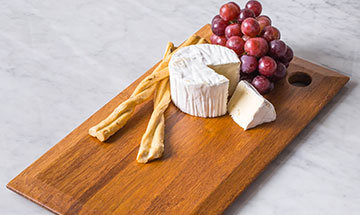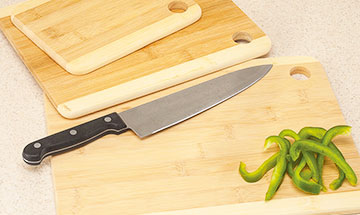Contents
- 1 Bamboo cutting board Care:
- 2 Is Bamboo good for cutting boards?
- 3 Why do Bamboo chopping blocks have the edge over their plastic and wood counterparts?
- 4 Can bamboo cutting boards go in the dishwasher?
- 5 Can you use olive oil on bamboo cutting boards?
- 6 How to Care for bamboo cutting boards: Other oils to use
- 7 Can you use coconut oil on bamboo cutting boards?
- 8 Conclusion:
Do you agree that a chopping block is one of the essential kitchen utensils you can have? They come in several shapes, sizes, and thicknesses. You might have heard conflicting advice on which kind of chopping block is more efficient, sanitary, and less damaging to life! Bamboo butcher blocks are most preferred among other types due to the flexibility and durability they offer.
Bamboo cutting board Care:

Bamboo is an environmentalists’ favorite. A bamboo chopping block can stay at your counter for longer years if cared and maintained properly. These guidelines and sets of instructions given below can extend the life of your block.
Is Bamboo good for cutting boards?
You cannot prepare anything in a kitchen without a chopping block and a knife. Not every butcher block suits all types of tasks. Of late, bamboo cutting boards are more in demand due to the low cost and enormous benefits they offer.
Why do Bamboo chopping blocks have the edge over their plastic and wood counterparts?
Here comes a list of benefits which make bamboo a terrific choice for cutting boards:
- Eco-friendly: Eco-conscious people prefer to go with such utensils. Bamboo is considered a grass, not a tree. It grows and thrives rapidly without the need for chemical fertilizers. It will be all set to be harvested within three years, which is in contrast to maple, which takes over 30 years to fully mature. Once you harvest the grass, it can re-grow. New shoots spring up without replanting. It is highly renewable and sustainable. Keeping in mind that a chopping block is made of replenished materials, buying this type of cutting board can make you feel good.
- Light-weighted, yet strong: Bamboo is light-weighted, however, harder than most of the wood. Thus, it can make an excellent cutting surface. It is 16% harder than the traditional maple, which makes it significantly tough. Eco-friendly bamboo cutting blocks withstand deep scratches better than any other wood. You can expect a high life expectancy compared to conventional chopping trays.
- Knife-friendly: Anybody who is quite serious about cooking has the best kitchen knife set. Using a high-quality cutting board is imperative in such cases as cheap plastic, and wooden boards tend to dull edges of your expensive knives. While using this cutting block, your knife blade is smacking the individual strands of the grass rather than a hard solid surface as in other butcher blocks. As a result of which your knife will stay retain its sharpness for many years.
- Non-porous: The major problem you encounter while using a wooden cutting board is that it absorbs liquid making it prone to warping and cracking. Bamboo is non-porous by nature, and it is a non-absorbent.
- Resistance to bacteria: It can fight bacteria. Plastic blocks are more susceptible to cracks, wear, and tear while cutting. Also, maple can be scarred by a chef’s knife, which can leave room for moisture and food particles. It also gives bacteria, a favorable environment to grow and thrive. Bamboo is dense enough to resist knife blemishing. It also resists the penetration of water and letting harmful bacteria to accumulate.
- Appealing: Eco-friendly chopping blocks are not only functional but also aesthetically appealing. Who on earth doesn’t like the natural look of the bamboo and the elegance it carries? It looks clean and sleek, it goes well with any kitchen decor. You can even flaunt it in a dining table as a beautiful serving block. You don’t have to worry about wood scarring, staining and it is less likely to crack. Your butcher block stays sleek and smooth for a long time.
- Easy maintenance: Simple washing with warm soapy water every time after use and monthly oil treatment suffices to preserve the goodness and look of your cutting board. After working with raw meat, it is essential to sanitize a block with vinegar or bleach solution to get rid of the odor.

Can bamboo cutting boards go in the dishwasher?

One of the most common questions that come up with home chefs is, ‘Should I put my chopping block in a dishwasher?’ The answer is a firm ‘No’!
Though it is technically not wood, butcher blocks made from them behave the same way as that of wooden boards. These chopping blocks are made in a particular way where the grass is flattened with the application of high pressure and glue treatment. It makes blocks vulnerable to water and heat inside your dishwasher.
If you still intend to put it inside the dishwasher, be prepared enough to see it coming out warped!
Recently, bamboo cutting board dishwasher compatible is launched in the market. Sadly, not much information about the product is on reach.
Can you use olive oil on bamboo cutting boards?
Proper care for a bamboo cutting board can let it stay as the most desirable kitchen implement. It needs TLC now and then to preserve its luster and functionality. Never use cooking oil like olive oil on the surface as it can turn rancid. They let bacteria thrive rather than inhibiting it.
How to Care for bamboo cutting boards: Other oils to use
In order to revitalize the base substance, you can apply mineral oil over the surface of your board twice a month, pour a few drops of oil and spread it throughout a board using a soft piece of cloth. Keep it overnight and buff off excess oil so that your board doesn’t feel damp.
Natural beeswax is an excellent choice for these boards’ care. Treatment with beeswax hydrates and keeps your bamboo board shiny and water-resistant. Other ways to care for bamboo are Brazil wax, baking soda, and lemon juice. These are some cool ingredients that can be used to keep your butcher block as good as a new one.
Can you use coconut oil on bamboo cutting boards?

Coconut oil is indispensable in every kitchen. It is an excellent skin moisturizer and great cooking oil. Coconut oil is an extensively popular ingredient used to maintain cutting blocks as it has proven to resist Rancidification. It is non-sticky, vegetarian-friendly, and stays stable even at high temperatures. Coconut oil has anti-bacterial properties, thus it resists the building up of bacteria over the surface of the board. Take a spoon full of oil, apply all over the butcher block, and let it rest for 6 hours before it is all set to be used.
Conclusion:
Bamboo cutting boards are easy to maintain and are pretty economical. Caring for bamboo cutting board keeps it intact, protects your best steak knives from damage and preserves sanity. So, what is your take on care for cutting boards? Do you know any magical substance that can do miracles to your cutting block? Do share; MyKitchenAdvisor loves to hear!







